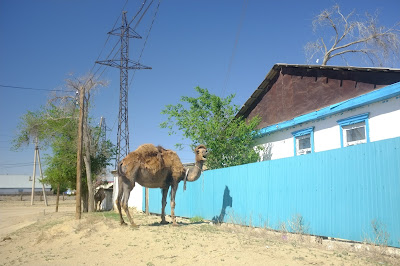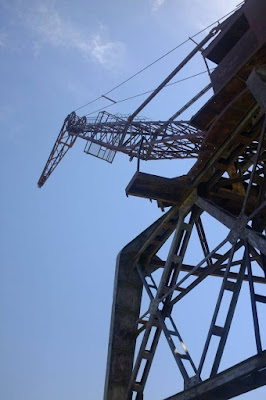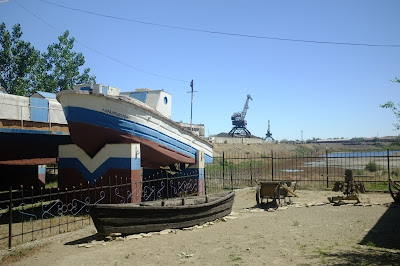How to hitchhike on a field
We are waiting for any cars to show up on the road. It's hot and windy, and only endless steppe is ahead of us. Again, I'm a bit nervous. What if hitchhiking is actually difficult here and we will get stuck without water... Or what if we meet more zombie gorillas who will want to punch us like the ones a couple of days ago? Pepper spray wouldn't help at all in this wind.
I don't have time to imagine more things to be afraid of because a guy stops. Time to practice our fake Russian.
"Hello, we are hitchhiking. That means we travel without money. Can we still go with you?"
"Yes but I'm only going to the next village."
"How far is that?"
"100 km."
 |
| The Atyrau-Aktobe highway |
Our next car is a truck with two drivers - the one who is not driving wants to play Durak with Vojta. They ask us about our journey and want to know how much our government pays us for traveling. They are reluctant to believe that we are doing it voluntarily, for free, and our government has nothing to do with it.
Soon, we get to the crossroads. Our friends are headed north. Locals told them the highway straight to Aktobe was bad, so they are taking a detour.
The road looks normal, and in the map, it is drawn in red. And roads drawn in red are nice - they are big highways. So it can't be that bad, can it?
After a couple of kilometers we cover with an old Soviet minibus, the nice road becomes so full of potholes that there actually are more potholes than road. The driver doesn't bother with it and steers into the steppe. The ancient Soviet car shows to be a solid offroad. It doesn't seem to need any asphalt to go 60 km/h.
The wide field is full of intertwining car tracks but the driver never doubts which way to take. I'm trying to keep an idea where the asphalt road is, but I sometimes can't see it as we are jumping up an down on moulds. There at least is a railroad nearby going the same way, so I hope we won't get lost and be eaten by camels.
The driver leaves us near a Soviet monument in the middle of the field and continues to a village behind the train tracks. It seems that here, most drivers have mercy on the road and use it, so it might be a good hitchhiking spot. (Except that there are no cars.)
When there is a car, you can see it from afar. Or actually you can see a dust cloud. You watch it approaching for several minutes until you also hear the noise and eventually discover a car under the cloud - and then it goes past you as if the driver weren't surprised at all to see hitchhikers in here. It happens every ten minutes or so and it is the most interesting thing you can see around.
There is only one car which doesn't have a cloud of dust behind it. It is a white truck which is going very slowly - at first we think it is not moving at all. We watch it approaching for ages, and then it stops for us.
The driver is Iranian, doesn't speak any Kazakh or Russian and looks very much lost. We dig out of our heads some Farsi words we have almost forgotten, and he seems actually happy he met us. We spend in the truck next three hours - and cover 30 kilometers.
 |
| The best hitchhiking spot |
It is the first time the driver is going this way, and he too believed that the big red line in the map actually was a road. His car is made for nice flat asphalt. He is going 10 kilometers per hour, he sometimes tries to leave the pothole road and very often has to go back again when he comes across a bigger mould that his truck cannot climb up or down. And he is running out of his visa.
At evening, we stop in a village (yep, there is a village. And it has internet network coverage). The driver fails to find a shop in there. He looks like he is going through a culture shock.
Camping in the steppe is quite scary this time since anywhere we go, we are technically camping on the road. So we set the camp behind an iron pole and hope that a car doesn't bump into us. It is a bit colder here than in the hot south, so the night is actually comfortable for sleeping.
 |
| A zombie camel |
There we meet our Iranian again, and we know that our fate is to suffer up to Aktobe together. I mentally prepare for three more days in the wasteland, but surprise surprise, a real road starts in the middle of the way. When we are saying goodbye to each other on the outskirts of the city, we realize that the driver also ran out of money for food, so we give him some.
It's for free, we are Turkish
 |
| 1950s crane in Aral |
It's hot, the steppe is endless, the constant wind is throwing dust into our faces. I'm actually happy for the wind, though, because without it, the heat would be much more annoying. And if the wind stops at evening, mosquitoes attack us. We are covered in dust and sand. In almost a week, we find running water twice: once, it is a river, once a gardening hose in a park. Finding drinking water is also hard.
 |
| Meeting Johannes |
We meet Johannes, the Austrian biker, on the road on several occasions. The long way is tiring him too.
 |
| Harbour in Aral |
 |
| "Short history of the Aral sea" |
 |
| Our Uzbek hosts |
"For you it's for free. Where are you from?"
"Err... thanks. From Czechia. We are hitchhiking."
"Oh I see. Come have a meal." A small group gathered around me.
"Thanks a lot but my friend is waiting..."
"Where?"
"Over there. He is building a tent."
"Go and get him here, tonight you sleep here. Be our guests."
I bring Vojta and to be sure, I ask again how much a meal is in the cafe.
"I said it's for free!" the technician, probably owner, gets almost mad. "We are Turkish!"
He gives us a hotel room and a meal and lets us use shower, a washing machine and power plugs. We wash almost all our stuff and for a while, we get rid of wind, dirt, mosquitoes and the burning sun. I realize that taking a shower is one of my dearest hobbies. I am absolutely happy.
Almaty: the fanciest city in Central Asia
 |
| Lunch with a Turkish truck driver |
We hitch a ride with an Uzbek couple. The lady - her name is Gulnura - tells me about Uzbekistan, about winters in Kazakhstan, about Kazakh language... They also invite us for a delicious meal. Kazakhstan seems to be suddenly spoiling us.
We meet another Turk, a truck driver, and he adopts us for a while as well. We cook pasta together in his truck kitchen. Meeting Turks is nice. The world would be sadder without Turks.
 |
| Almaty |
We get in touch with a Couchsurfer who lets us stay with her. Let's call her Aygerim even though her real name is way less Kazakh. She also is cool, fancy and international, and speaks more Russian than Kazakh. She has no idea about all the versions of saying hi according to people's sex. She has never really been to any other Kazakhstan cities except Almaty and Astana because there is no point. Other city people hardly ever go to the west of the country either.
We are enjoying life in civilization again - Aygerim shows us some of the fancy parks, a cable car, and we go to a swimming pool. I smoke weed with her and her friends and I get high and I'm surprised because normally it doesn't work on me. Aygerim tells us that once, her mom found the weed but Aygerim told her she only was selling it, not smoking it, and her mom was ok with that.
She also drives us to the Mongolian embassy and we get so far the quickest visa in our lives - a sleepy guy in the shabby building seems to look a bit surprised we actually came to the embassy for a visa.
Aygerim studies abroad and tells us that she just wants to get out of Kazakhstan - pretty much everybody who can afford paying a school abroad do their studies elsewhere because local universities are bad. She is rather critical about the government, too.
We get in touch with the Dutch guys, their friend Denis and his wife Adisa again. Denis tells us a story about an unknown drunk dude in a traditional costume with an ax that was threatening to kill his wife for marrying a foreigner. Seems that Almaty also has some not very modern people.
We also see Karla, a girl that Vojta met at a train station in Beyneu, and she drives us to the mountains. At the beginning, there are some of the fanciest and most expensive hotels. The rich Almaty people seem to love going to the mountains dressed up, with high-heeled shoes and satin dresses, to take selfies. The mountains are tall and wild and eventually we get to a place without buildings. On the other side, there is Kyrgyzstan and the Issyk-kul lake. A guy tells us that in the Soviet times, he used to walk there on foot. We find an old observatory; Karla climbs up the rusty construction and we follow her - it's fun to see such a classy girl to enjoy urban exploring. We then spontaneously climb a mountain of 3800 meters, the highest place I've ever been to, and I again feel almost like after smoking weed. Then we have a picnic at a lake and are kicked off by some very important chieftains because we are foreigners. They probably also want us to give them money, but Karla is just being nice at them and keeps smiling and they let us go.
 |
| Reunion with our friends |


No comments:
Post a Comment